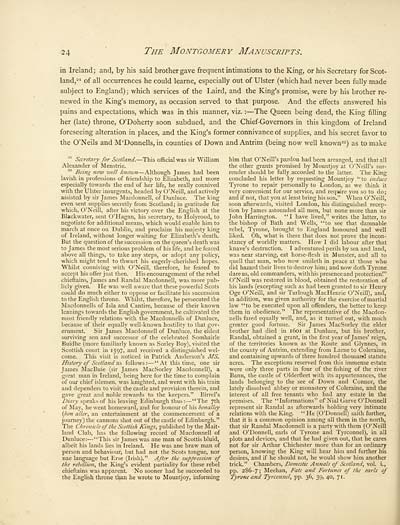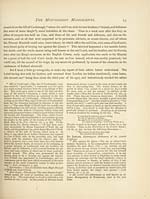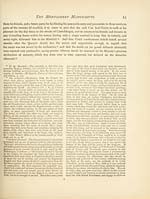Montgomery manuscripts
(38) Page 24
Download files
Complete book:
Individual page:
Thumbnail gallery: Grid view | List view

24
The Montgomery Manuscripts.
in Ireland; and, by his said brother gave frequent intimations to the King, or his Secretary for Scot-
land, 21 of all occurrences he could learne, especially out of Ulster (which had never been fully made
subject to England); which services of the Laird, and the King's promise, were by his brother re-
newed in the King's memory, as occasion served to that purpose. And the effects answered his
pains and expectations, which was in this manner, viz. : — The Queen being dead, the King filling
her (late) throne, O'Doherty soon subdued, and the Chief-Governors in this kingdom of Ireland
foreseeing alteration in places, and the King's former connivance of supplies, and his secret favor to
the O'Neils and M'Donnells, in counties of Down and Antrim (being now well known 22 ) as to make
~' Secretary for Scotland. — This official was sir William
Alexander of Menstrie.
Being now xoell known — Although James had been
lavish in professions of friendship to Elizabeth, and more
especially towards the end of her life, he really connived
with the Ulster insurgents, headed by O'Neill, and actively
assisted by sir James Macdonnell, of Dunluce. The king
even sent supplies secretly from Scotland; in gratitude for
which, O'Neill, after his victory over the English at the
Blackwater, sent O'Hagan, his secretary, to Holyrood, to
negotiate for additional means, which would enable him to
march at once on Dublin, and proclaim his majesty king
of Ireland, without longer waiting for Elizabeth's death.
But the question of the succession on the queen's death was
to James the most serious problem of his life, and he feared
above all things, to take any steps, or adopt any policy,
which might tend to thwart his eagerly-cherished hopes.
Whilst conniving with O'Neill, therefore, he feared to
accept his offer just then. His encouragement of the rebel
chieftains, James and Randal Macdonnell, was more pub-
licly given. He was well aware that these powerful Scots
could do much either to oppose or facilitate his succession
to the English throne. Whilst, therefore, he persecuted the
Macdonnells of Isla and Cantire, because of their known
leanings towards the English government, he cultivated the
most friendly relations with the Macdonnells of Dunluce,
because of their equally well-known hostility to that gov-
ernment. Sir James Macdonnell of Dunluce, the eldest
surviving son and successor of the celebrated Somhairle
Buidhe (more familiarly known as Sorley Boy), visited the
Scottish court in 1597, and received a distinguished wel-
come. This visit is noticed in Patrick Anderson's MS.
History of Scotland m follows: — "At this time, one sir
James MacBuie (sir James MacSorley Macdonnell), a
great man in Ireland, being here for the time to complain
of our chief islemen, was knighted, and went with his train
and dependers to visit the castle and provision therein, and
gave great and noble rewards to the keepers." Birrel's
Diary speaks of his leaving Edinburgh thus: — "The 7th
of May, he went homeward, and for honour of his bonalley
(ion alter, an entertainment at the commencement of a
journey) the cannons shot out of the castle of Edinburgh. "
The Chronicle of the Scottish Kings, published by the Mait-
land Club, has the following record of Macdonnell of
Dunluce: — "This sir James was ane man of Scottis bluid,
albeit his lands lies in Ireland, He was ane braw man of
person and behaviour, but had not the Scots tongue, nor
nae language but Erse (Irish)." After the suppression of
the rebellion, the King's evident partiality for these rebel
chieftains was apparent. No sooner had he succeeded to
the English throne than he wrote to Mountjoy, informing
him that O'Neill's pardon had been arranged, and that all
the other grants promised by Mountjoy at O'Neill's sur-
render should be fully accorded to the latter. The King
concluded his letter by requesting Mountjoy "to induce
Tyrone to repair personally to London, as we think it
very convenient for our service, and require you so to do;
and if not, that you at least bring his son." When O'Neill,
soon afterwards, visited London, his distinguished recep-
tion by James astounded all men, but none more than sir
John Harrington. "I have lived," writes the latter, to
the bishop of Bath and Wells, "to see that damnable
rebel, Tyrone, brought to England honoured and well
liked. Oh, what is there that does not prove the incon-
stancy of worldly matters. How I did labour after that
knave's destruction. I adventured perils by sea and land,
was near starving, eat horse-flesh in Minister, and all to
quell that man, who now smileth in peace at those who
did hazard their lives to destroy him; and now doth Tyrone
dareus, old commanders, withhis presenceand protection!"
O'Neill was restored in blood, obtained the restoration of
his lands (excepting such as had been granted to sir Henry
Oge O'Neill, and sir Turlough MacHenrie O'Neill), and,
in addition, was given authority for the exercise of martial
law "to be executed upon all offenders, the better to keep
them in obedience." The representative of the Macdon-
nells fared equally well, and, as it turned out, with much
greater good fortune. Sir James MacSorley the elder
brother had died in 1601 at Dunluce, but his brother,
Randal, obtained a grant, in the first year of James' reign,
of the territories known as the Route and Glynnes, in
the county of Antrim, extending from Larne to Coleraine,
and containing upwards of three hundred thousand statute
acres. The exceptions reserved from this immense estate
were only three parts in four of the fishing of the river
Bann, the castle of Olderfleet with its appurtenances, the
lands belonging to the see of Down and Connor, the
lately dissolved abbey or monastery of Coleraine, and the
interest of all free tenants who had any estate in the
premises. The "Informations" of Nial Garve O'Donnell
represent sir Randal as afterwards holding very intimate
relations with the King. " He (O'Donnell) saith further,
that it is a common opinion among all them in the north,
that sir Randal Macdonnell is a party with them (O'Neill
and O'Donnell, earls of Tyrone and Tyrconnel), in all
plots and devices, and that he had given out, that he cares
not for sir Arthur Chichester more than for an ordinary
person, knowing the King will hear him and further his
desires, and if he should not, he would show him another
trick." Chambers, Domestic Annals of Scotland, vol. i.,
pp. 286-7 ; Meehan, Fate and Fortunes of the earls of
Tyrone and Tyrconnel, pp. 36, 39, 40, 71.
The Montgomery Manuscripts.
in Ireland; and, by his said brother gave frequent intimations to the King, or his Secretary for Scot-
land, 21 of all occurrences he could learne, especially out of Ulster (which had never been fully made
subject to England); which services of the Laird, and the King's promise, were by his brother re-
newed in the King's memory, as occasion served to that purpose. And the effects answered his
pains and expectations, which was in this manner, viz. : — The Queen being dead, the King filling
her (late) throne, O'Doherty soon subdued, and the Chief-Governors in this kingdom of Ireland
foreseeing alteration in places, and the King's former connivance of supplies, and his secret favor to
the O'Neils and M'Donnells, in counties of Down and Antrim (being now well known 22 ) as to make
~' Secretary for Scotland. — This official was sir William
Alexander of Menstrie.
Being now xoell known — Although James had been
lavish in professions of friendship to Elizabeth, and more
especially towards the end of her life, he really connived
with the Ulster insurgents, headed by O'Neill, and actively
assisted by sir James Macdonnell, of Dunluce. The king
even sent supplies secretly from Scotland; in gratitude for
which, O'Neill, after his victory over the English at the
Blackwater, sent O'Hagan, his secretary, to Holyrood, to
negotiate for additional means, which would enable him to
march at once on Dublin, and proclaim his majesty king
of Ireland, without longer waiting for Elizabeth's death.
But the question of the succession on the queen's death was
to James the most serious problem of his life, and he feared
above all things, to take any steps, or adopt any policy,
which might tend to thwart his eagerly-cherished hopes.
Whilst conniving with O'Neill, therefore, he feared to
accept his offer just then. His encouragement of the rebel
chieftains, James and Randal Macdonnell, was more pub-
licly given. He was well aware that these powerful Scots
could do much either to oppose or facilitate his succession
to the English throne. Whilst, therefore, he persecuted the
Macdonnells of Isla and Cantire, because of their known
leanings towards the English government, he cultivated the
most friendly relations with the Macdonnells of Dunluce,
because of their equally well-known hostility to that gov-
ernment. Sir James Macdonnell of Dunluce, the eldest
surviving son and successor of the celebrated Somhairle
Buidhe (more familiarly known as Sorley Boy), visited the
Scottish court in 1597, and received a distinguished wel-
come. This visit is noticed in Patrick Anderson's MS.
History of Scotland m follows: — "At this time, one sir
James MacBuie (sir James MacSorley Macdonnell), a
great man in Ireland, being here for the time to complain
of our chief islemen, was knighted, and went with his train
and dependers to visit the castle and provision therein, and
gave great and noble rewards to the keepers." Birrel's
Diary speaks of his leaving Edinburgh thus: — "The 7th
of May, he went homeward, and for honour of his bonalley
(ion alter, an entertainment at the commencement of a
journey) the cannons shot out of the castle of Edinburgh. "
The Chronicle of the Scottish Kings, published by the Mait-
land Club, has the following record of Macdonnell of
Dunluce: — "This sir James was ane man of Scottis bluid,
albeit his lands lies in Ireland, He was ane braw man of
person and behaviour, but had not the Scots tongue, nor
nae language but Erse (Irish)." After the suppression of
the rebellion, the King's evident partiality for these rebel
chieftains was apparent. No sooner had he succeeded to
the English throne than he wrote to Mountjoy, informing
him that O'Neill's pardon had been arranged, and that all
the other grants promised by Mountjoy at O'Neill's sur-
render should be fully accorded to the latter. The King
concluded his letter by requesting Mountjoy "to induce
Tyrone to repair personally to London, as we think it
very convenient for our service, and require you so to do;
and if not, that you at least bring his son." When O'Neill,
soon afterwards, visited London, his distinguished recep-
tion by James astounded all men, but none more than sir
John Harrington. "I have lived," writes the latter, to
the bishop of Bath and Wells, "to see that damnable
rebel, Tyrone, brought to England honoured and well
liked. Oh, what is there that does not prove the incon-
stancy of worldly matters. How I did labour after that
knave's destruction. I adventured perils by sea and land,
was near starving, eat horse-flesh in Minister, and all to
quell that man, who now smileth in peace at those who
did hazard their lives to destroy him; and now doth Tyrone
dareus, old commanders, withhis presenceand protection!"
O'Neill was restored in blood, obtained the restoration of
his lands (excepting such as had been granted to sir Henry
Oge O'Neill, and sir Turlough MacHenrie O'Neill), and,
in addition, was given authority for the exercise of martial
law "to be executed upon all offenders, the better to keep
them in obedience." The representative of the Macdon-
nells fared equally well, and, as it turned out, with much
greater good fortune. Sir James MacSorley the elder
brother had died in 1601 at Dunluce, but his brother,
Randal, obtained a grant, in the first year of James' reign,
of the territories known as the Route and Glynnes, in
the county of Antrim, extending from Larne to Coleraine,
and containing upwards of three hundred thousand statute
acres. The exceptions reserved from this immense estate
were only three parts in four of the fishing of the river
Bann, the castle of Olderfleet with its appurtenances, the
lands belonging to the see of Down and Connor, the
lately dissolved abbey or monastery of Coleraine, and the
interest of all free tenants who had any estate in the
premises. The "Informations" of Nial Garve O'Donnell
represent sir Randal as afterwards holding very intimate
relations with the King. " He (O'Donnell) saith further,
that it is a common opinion among all them in the north,
that sir Randal Macdonnell is a party with them (O'Neill
and O'Donnell, earls of Tyrone and Tyrconnel), in all
plots and devices, and that he had given out, that he cares
not for sir Arthur Chichester more than for an ordinary
person, knowing the King will hear him and further his
desires, and if he should not, he would show him another
trick." Chambers, Domestic Annals of Scotland, vol. i.,
pp. 286-7 ; Meehan, Fate and Fortunes of the earls of
Tyrone and Tyrconnel, pp. 36, 39, 40, 71.
Set display mode to:
![]() Universal Viewer |
Universal Viewer | ![]() Mirador |
Large image | Transcription
Mirador |
Large image | Transcription
Images and transcriptions on this page, including medium image downloads, may be used under the Creative Commons Attribution 4.0 International Licence unless otherwise stated. ![]()
| Histories of Scottish families > Montgomery manuscripts > (38) Page 24 |
|---|
| Permanent URL | https://digital.nls.uk/95233383 |
|---|
| Description | A selection of almost 400 printed items relating to the history of Scottish families, mostly dating from the 19th and early 20th centuries. Includes memoirs, genealogies and clan histories, with a few produced by emigrant families. The earliest family history goes back to AD 916. |
|---|

